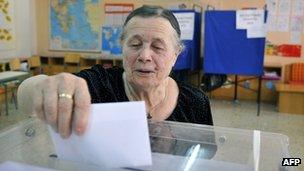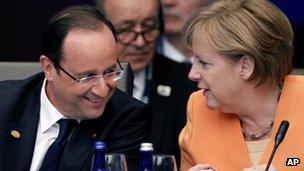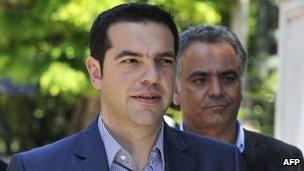Europe's dangerous days
- Published
- comments

Greeks must hold a new election after politicians failed to form a coalition government
Europe's date with destiny has been inked in. June the 17th - when the Greeks return to the polls.
If they back candidates who reject the terms of the bailout deal that keeps the country from bankruptcy, Greece could be heading out of the euro.
Between now and then will be nearly four weeks of anxiety.
The biggest threat is that some event sparks a run on the banks - in either Greece or Spain.
Greeks have withdrawn 3bn euros in the past two weeks but there is no panic.
'Poverty, war and coup'
As the crisis deepens the Greek chorus is in full cry. It is not, however the Greeks who are doing the commenting; the cacophony of voices - mainly from outside Greece - is directed at the Greek people themselves.
In the past week they have been told that if they exit the euro they face mass poverty, civil war, a coup, hunger and the need for safe corridors to bring in humanitarian aid.
Charles Dallara, who heads the Institute of International Finance said the consequences of Greece leaving the single currency were "somewhere between catastrophic and Armageddon'".
Outside the euro, the Greek people have been told, there would be a run on the banks, exchange controls, bankruptcy and hyperinflation.
And the Jeremiads have scarcely begun.
Europe 'bluffing'
Over the next four weeks an intense battle will be fought for hearts and minds of the Greek voter.
European leaders have already tried to define the vote as a referendum on staying in the euro.
UK Prime Minister David Cameron, in Chicago, said: "We now have to send a very clear message to (the Greek) people - there is a choice, you can either vote to stay in the euro with all the commitments you have made, or, if you vote another way, you are effectively voting to leave."
Much of this is aimed at weakening the hand of the main anti-austerity candidate, 37-year-old Alexis Tsipras.
He was the rising star of the recent elections describing the austerity measures as "barbaric". He wants to stay in the euro but rejects the conditions of the bailout.

Francois Hollande and Angela Merkel have pledged to work together despite their differences
Mr Tsipras believes Europe's leaders are bluffing.
The more they warn of the dangers to Europe of Greece leaving the eurozone the more it strengthens his hand, he believes.
He does not believe the Germans would risk forcing them out.
German Chancellor Angela Merkel is on record as saying the risks of a Greek exit are "incalculable and therefore irresponsible". This risk-averse politician has not changed her mind.
Austerity vs growth
And then there is the arrival on the stage of the new French President Francois Hollande.
On his first day in office he spoke of adding measures to help growth in Greece.
Some voices have spoken of Greece needing a Marshall Plan to give the country a fighting chance to recover. Still others have suggested diverting EU structural funds to boost growth
All of this only confirms to a politician like Mr Tsipras that the game is very much in play.
Meanwhile the Greeks will watch as Europe debates the very policy that so many of them object to: austerity.
Increasingly, as was revealed at the G8 meeting, the emphasis is on growth.
In many senses it is a false debate. Every politician wants growth. The question is how it is achieved at a time when deficits still have to be reduced.
Here there are important differences between Angela Merkel and Francois Hollande.

The leader of Greece's left-wing Syriza party, Alexis Tsipras, has threatened to tear up the bailout agreement
She believes growth comes from structural reforms; freeing up the labour markets. He believes in increased spending particularly on infrastructure and training.
On Wednesday at an informal dinner in Brussels these differences will be aired before Europe's leaders.
The new French president believes he is now the standard carrier for a majority.
He says he wants no taboos, no red lines. Every subject must be on the table, he says.
Room for compromise
So eurobonds, where debt would be underwritten by all 17 countries that use the currency, will be debated again.
Mrs Merkel sees that as a short-step to Germany bankrolling the irresponsibility of others.
Mr Hollande would like to see the European Central Bank lending directly to EU states via the main bailout fund.
That is anathema to the Germans who fear the independence of the central bank will be compromised.
The two leaders might agree on project bonds - where money raised for infrastructure projects would be backed by all 17 eurozone members.
They might also agree on boosting the capital of the European Investment Bank so it can borrow to finance big projects.
The German chancellor will feel under intense pressure. What she will not do is to sanction more borrowing to stimulate growth.
The Greeks will be curious spectators to see whether Europe's approach to the crisis is changing.
That might influence how they vote.